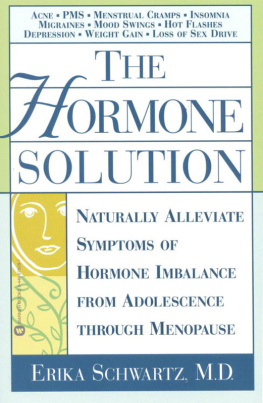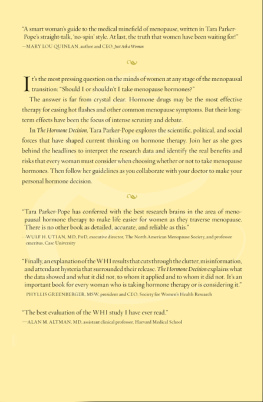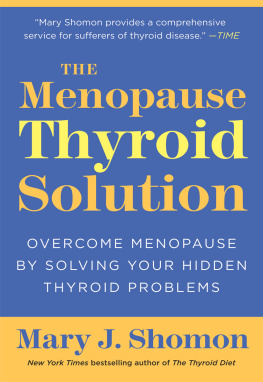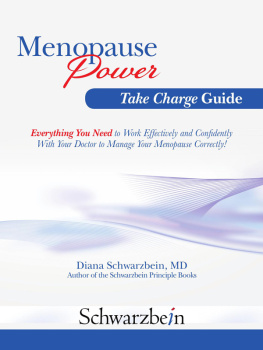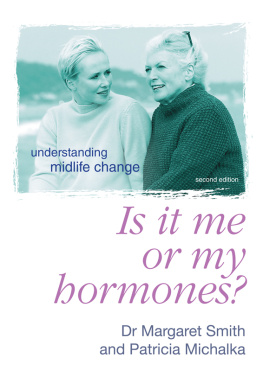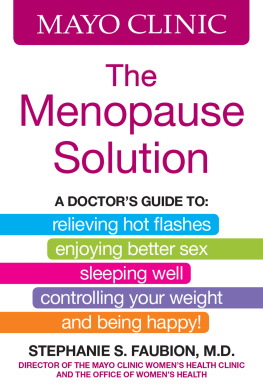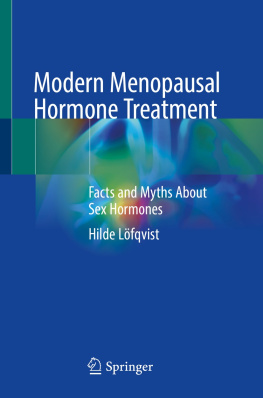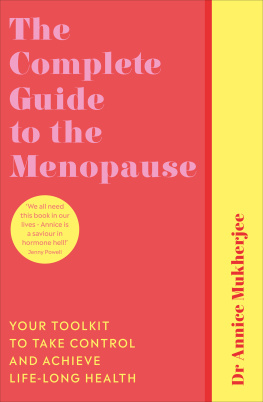HORMONES AND HOT
FLASHES
Real Questions and Straight Answers from
The Menopause Book
BY PAT WINGERT AND BARBARA KANTROWITZ

Copyright 2006, 2009, 2011 by Patrice Wingert and Barbara Kantrowitz
All rights reserved. No portion of this book may be reproducedmechanically, electronically, or by any other means, including photocopyingwithout written permission of the publisher. Published simultaneously in Canada by Thomas Allen & Son Limited.
Hormones and Hot Flashes is a condensation of material previously printed in THE MENOPAUSE BOOK by Pat Wingert and Barbara Kantrowitz.
ISBN: 978-0-7611-6573-6
Cover design by Janet Vicario
Workman books are available at special discounts when purchased in bulk for premiums and sales promotions as well as for fund-raising or educational use. Special editions or book excerpts can also be created to specification. For details, contact the Special Sales Director at the address below or send an e-mail to specialmarkets@workman.com.
Workman Publishing Company, Inc.
225 Varick Street
New York, NY 10014-4381
www.workman.com
CONTENTS
INTRODUCTION
We wrote THE MENOPAUSE BOOK because, like many of you, we were confused by the different messages we were getting about menopauseand we created this abbreviated e-version to spotlight the issues we got the most questions about: Were hormones dangerous or helpful? Would hot flashes last forever? What was the best way to navigate this important transition? We pored over the latest research, interviewed the best minds in the field, and attended conferences that brought all the experts together. We also spent a lot of time talking to real women about their experiences.
We found that being open about what women face at menopause is enormously helpful. Its no longer the hidden subject it once wasthe dreaded M word. After our book was first published in 2007, we traveled all over the country talking to hundreds of women about their health issues at midlife. The best part was meeting women our age who shared our commitment to embracing these years with energy and enthusiasm.
But there were frustrating moments as well. We saw many examples of how unscrupulous marketers are targeting midlife women, preying on our anxieties and insecurities about getting older. Remedies that promise much more than they can deliver are proliferating with alarming speed. Some of these can only harm your wallet; others can threaten your health for years.
We know that it can be hard to separate fact from fiction. We also know how confusing it is to sort through the headlines trumpeting breakthrough medical studies that are contradicted by equally highly touted research a short time later. Part of our mission is to tell you what you really need to know and what you should ignore.
Our essential message remains the same. You are smarter than ever, and you know what you want. Consider this transition as an opportunity to take charge of your health so you can get the most out of the years ahead.
To find out more about THE MENOPAUSE BOOK , flip or swipe to the end of this e-book.
Pat Wingert and Barbara Kantrowitz
PART I
THE HORMONE QUESTION

Estrogen will save your life! Estrogen will kill you! Its a natural fountain of youth! Its an insidious drug! Youve probably heard all these messages delivered with apparent sincerity by doctors, hucksters, scientists, famous talk show hosts, and celebrities of various pedigrees. No wonder youre confused. In this chapter, we will sort out the facts from the fiction.
We are not crusaders for either side in this contentious debate. Our only interest is in giving women as much up-to-date information as possible so that they can be informed partners with their doctors. Hormones are amazing chemicalspotent and complex. There is still so much that scientists have yet to understand about how they work. Too often, proponents mention only the benefits and critics stress only the risks. Estrogen therapy is the most effective way to stop hot flashes and help thinning bones. But the bulk of research also indicates that long-term use increases your risk of breast cancer and cardiovascular disease. This means that taking hormones may offer more benefits than risks at one age, but could be dangerous later on. There are a few women who may need to take estrogen for the rest of their lives and many more who are better off avoiding it altogether. Its a very individual choice, and whats right for your sister or your friend (or some celebrity on TV) may not be right for you.
First, some history. A decade ago, doctors routinely prescribed estrogen supplements to women at midlife because they thought estrogen protected their patients from heart disease, kept their brains healthy and their bones strongand even smoothed out pesky wrinkles. But then a major federal study called the Womens Health Initiative (WHI) found that women who took the most common combination of estrogen and progestin were at higher risk for breast cancer, stroke, blood clots, and heart attacks. Millions of women angrily threw out their pills. Some, still struggling with symptoms like hot flashes and vaginal dryness, ultimately went back on estrogen therapy. And, sadly, unscrupulous marketers plunged in, promoting so-called natural cures that have not been rigorously tested for safety or effectiveness. In the absence of high-quality studies comparing various forms of estrogen, major medical organizations agree that all forms of estrogenno matter how they might be marketedare likely to carry the same risks and benefits.
Before you work up too much of a sweat about taking hormones, we want to point out that this isnt the most important health choice most women will make during these years. Menopause is a time to rethink a lot of issues, including your heart health, the strength of your bones, your diet, and the amount of exercise and sleep you geteven the quality of your most intimate relationships. All of these things can have a much more significant effect on your future well-being than whether or not you use menopausal hormone therapy.
What Can Happen
For a generally healthy woman in her early 50s, the overall risks of using hormone therapy for a few years are low; your particular medical history determines your own vulnerability. The Food and Drug Administration requires manufacturers of FDA-approved hormone therapy products to state on their package labels that estrogen supplements should not be taken by:
Women who are pregnant
Women with a past or current history of breast cancer or one of the other estrogen-sensitive cancers (such as endometrial cancer) and women with liver disease
Oral estrogen should not be used by:
Women with very high triglyceride levels that put them at risk for coronary heart disease
Women who have had blood clots in their lungs or legs
Many women who try hormone therapy stop within a year because of side effects such as nausea, headaches, and breast tenderness. If you experience any of these but want to stay on hormones to deal with menopausal symptoms, talk to your doctor about lowering the dose or switching to another FDA-approved hormone supplement (e.g., patches instead of pills).
All About Estrogen
As a hormone, estrogen acts as a chemical messenger in your body, telling cells what to do. As a sex hormone, it performs the important task of developing and regulating the parts of your body that make you female.


